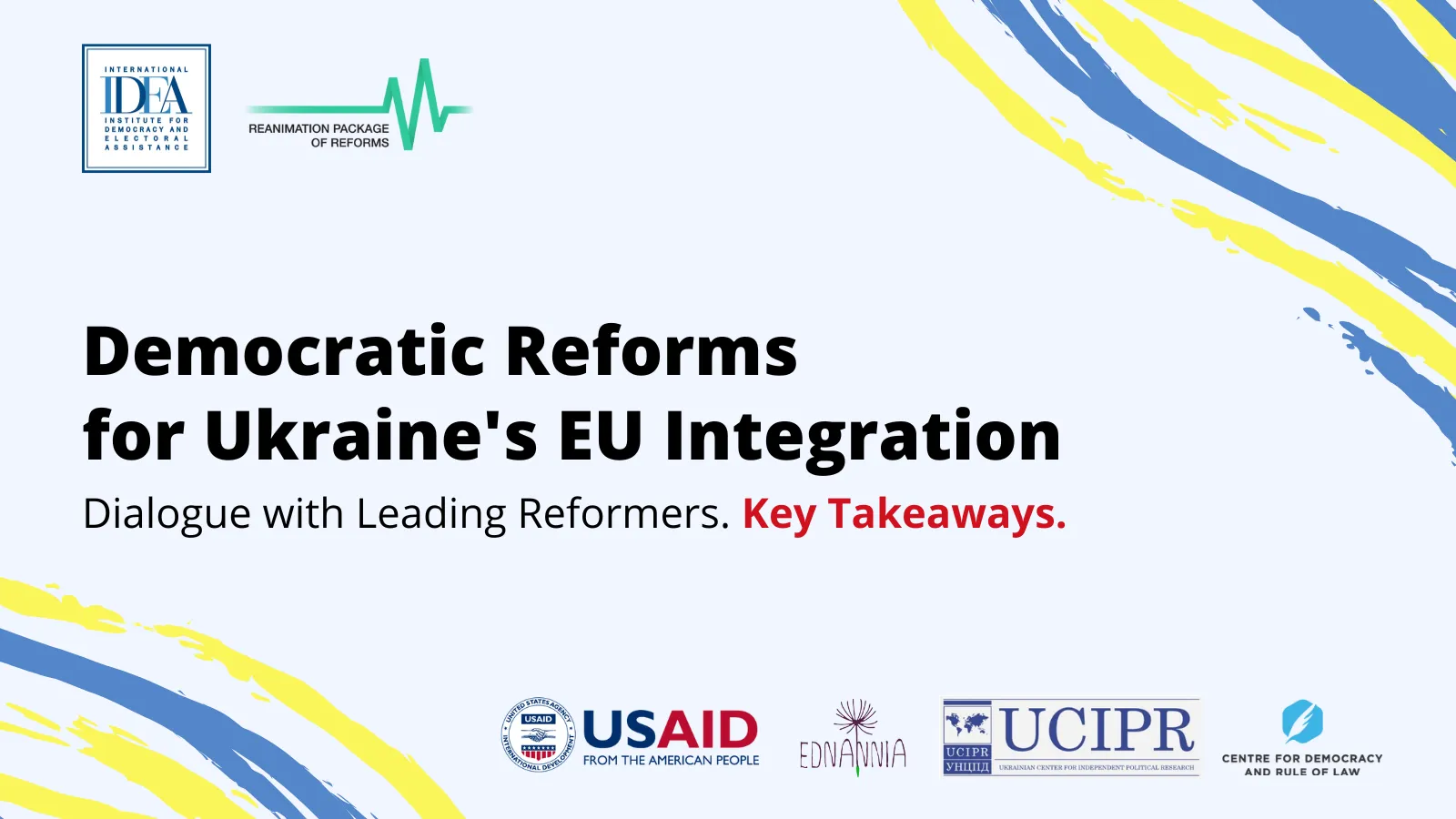Democratic Reforms for Ukraine's EU Integration: Dialogue with Leading Reformers. Key Takeaways.

This dialogue brought together reform-makers from Ukraine’s Government and civil society to discuss where Ukraine’s strongest achievements lie in its post-Euromaidan reforms, how these achievements enhance the country’s standing to achieve its EU candidate status, and what more remains to be done. Panellists discussed how the Government and civil society should work to ensure that the substantive progress achieved is not rolled back due to the continuing large-scale war perpetrated by Russia. The following are the key achievements discussed and the next steps identified by the speakers. The actions recommended below should contribute to the ongoing planning and prioritisation of reforms for Ukraine's eventual EU accession.
PARLIAMENT AS AN INSTITUTION FOR DEMOCRATIC LAW-MAKING AND PUBLIC ACCOUNTABILITY
Achievements:
- Within the framework of a semi-presidential system of government, the parliament as an institution for democratic law-making has gained more credibility and influence in policymaking.
- Law-making is better organized, as it is based on a clearer work planning process with better prioritization. The number of draft laws submitted for consideration has decreased significantly, while the quality of the submitted drafts has notably improved. It is hoped that this present dynamic will become a sustained trend in the future.
- The parliament is open to and welcomes expertise from civil society. Public communication and accountability have improved and are expected to remain the same during the changed context of the Russian invasion.
Actions needed:
- The cabinet of ministers should demonstrate increased leadership in initiating legislation. Parliamentarians should retain the right of legislative initiative, but the bulk of law-making should originate from the government.
- Law-making should be underpinned by higher quality expertise, including the expertise for harmonization of new laws with European Union legislation.
- Parliamentary oversight of the executive should be consistent and regular, including the procedures applied in peacetime as well as those specially developed for the oversight of wartime decision-making.
- The parliament should invest in the development of high-quality human resources to build a robust institutional capacity.
- The continued leadership of the parliament will be vital in ensuring that Ukraine fully meets its commitments in order to achieve membership of the European Union. This includes strengthening the country’s institutional architecture for combatting corruption and strengthening the independence and impartiality of its justice system.
DECENTRALISATION AND BUILDING OF EFFECTIVE LOCAL SELF-GOVERNMENT
Achievements:
- The ongoing reforms, first launched in 2014, have shown tangible results and significant successes. The reform redesigned and optimised the territorial-administrative structure and enabled financial decentralisation. Consecutive governments consistently carried this complex reform forward, ensuring its continuity and avoiding its politicisation. Public acceptance and support for the reforms have gradually increased;
- The reforms also streamlined the roles and functions of regional governments, granting them the role of important intermediaries and facilitators of effective local governance.
- As a result of the reforms, voluntary associations of unified local communities have been created across the country, and the new local government bodies were elected in 2019. New, decentralized competencies and financial capacities are defined and their implementation is underway, albeit with many challenges.
- The self-organization and resistance shown by regional and local authorities in countering the Russian aggression is an ultimate indicator of this success.
Actions needed:
- Local authorities resist and fight against the Russian invasion with unprecedented heroism and determination. Dozens of local councilors and mayors have been abducted, murdered, or remain in captivity. Administrative, financial and infrastructure resources are fully engaged in the defense effort. This will have profound consequences on the immediate and longer-term course of local self-government development.
- The decentralization reforms have proceeded without relevant constitutional amendments, which are necessary to provide strategic clarity and ensure continuity and irreversibility of the fundamental principles of democratic local self-government. In the wake of the ongoing war, it is hoped that the political actors and the public will forge an agreement to adopt such amendments.
- Streamlining the legal framework for local and regional governments will remain a key priority. This includes the adoption of the reformed legislation on the administrative-territorial division of the country, law on local public administration, law on local referendums, local public participation and democracy, and law on public service in local self-government bodies. However, these efforts must align with the consequences and the recovery needs after the war, which are yet to be determined.
- The ongoing war and the occupation of parts of Ukraine require the revision and re-orientation of local development plans so that the communities in need receive the necessary support from those that have experienced less damage. Internal migration adds a major layer of complexity to this challenge. The role of the state and civic oversight will be important to ensure that the international and local resources allocated for the recovery and renewal of Ukraine are used properly. Ukrainian local authorities look forward to benefitting from international peer partnerships such as city-to-city friendships and other support schemes.
PROMOTING ELECTORAL INTEGRITY AND TRANSPARENCY OF POLITICAL FINANCE
Achievements:
- After several phases of the reform, its various components are well-advanced and enable the conduct of well-administered elections. Codification of the election legislation, introduction of a list-proportional electoral system with open lists, introduction of proportional sanctions for violations, and several other procedural improvements in the administration of elections are among the key achievements of the reform.
- With the rising campaign expenditure and the lack of transparency, tangible reforms in this field were long overdue. The legal basis for the provision of public funding for parties and the requisite standards for transparency and accountability are established, albeit with many challenges in ensuring transparency and accountability in practice.
- As a result of the introduction of gender-based quotas, the proportion of women in the 2019 parliament increased to 21 per cent from the previous 12 per cent.
Actions needed:
- Ensuring the voting rights and opportunities for internally displaced persons and those who have relocated to other countries will be the central challenge for Ukraine in the months and years to come. Along with this, election authorities will have to work to re-establish the physical infrastructure, which in the past housed the polling stations but has now been destroyed.
- Accounting for income and expenditure by candidates and parties has been on-hold since the start of the Covid-19 pandemic. Continued lack of transparency in political finance can inflict serious damage to electoral integrity and should be fully re-established. Additional regulation is necessary for accountability and transparency of political finance at sub-national/regional levels.
- Regulation of so-called third parties in campaigning is urgently needed. This should cover the roles played by media outlets, advertisement agencies and other service providers that enable electoral candidates to campaign. Electoral and the anti-corruption oversight authorities should aim to fully digitilize this process to ensure effective oversight and public accountability.
- The civic oversight of the electoral integrity, including political finance integrity will be critical for the continued success of this reform. Electoral authorities should continue to seek the support and expertise of civil society organizations.




